I now took up the respectable life of a young university professor.
I had a pretty good idea of what was expected of me ... and how I
was going to meet those expectations.
I settled quickly
into my classes and then began to look
around at my setting (Mobile). I had spent
enough time in Texas to know that Alabama was a very different kind
of "South." I was interested in learning
more. 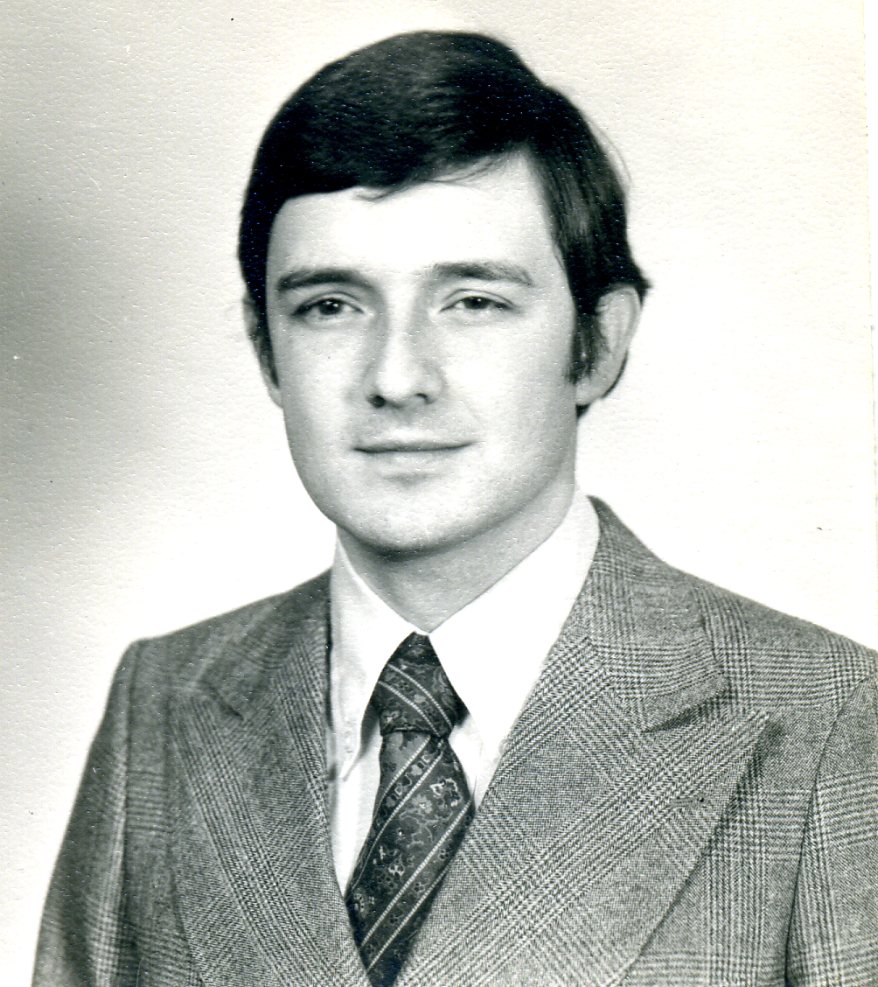


|
BECOMING THE CONSUMMATE
UNIVERSITY PROFESSOR
|
|
|
|
The
political science department
On the other hand, I found working with
the fellow members of my department at the teaching job itself to be
quite pleasant. The department chairman, David (a Harvard PhD from
Missouri) had no particular social pretensions of his own, was very
supportive of whatever it was that I wanted to bring to action, and
just in general was a great person to work with. His wife, Janet, was
also very gracious, a teacher in the special-education world, who had a
lot of ideas to share with Martha.
The only "problematic" individual in the department was a young lady
(who didn't stay long) who felt that she had to always be actively
opposed to the system, especially the way it worked to favor men. For
instance, she blew up at me once when I found myself in front of her as
we headed toward the building where our classes were, and made the
horrible mistake of opening the door for her. What a male chauvinist I
was for doing that! She could open her doors herself, thank you! Wow!
Ultimately she moved on, unable to bring about the "reforms" that seemed to engage her so much.
Next door was a very likable guy, Bob, a quite happy "good-old-boy"
that I came to like very much. He had married a very interesting German
girl that he had met when posted as a NATO officer in Germany. He now
headed up the university's Criminal Justice Program, but also spent
about as little time as I did on campus (he was very active with the
Mobile police force).
There was an American politics professor down the hall, Joe, who had
lost his foot at the disaster of Anzio (Italy) during World War Two.
And there was a quite young Black professor who joined the staff the
same year I did, who was actually local – and of "elite" status within
that Mobile society! I was amazed to learn, from getting to know him,
that there was also a Black Southern aristocracy, one that worked
behind the scenes just like the White Southern aristocracy – performing
the same roles in directing their respective communities. In fact, the
two groups, Black and White, often worked closely together – as I was
soon to find out personally. He did not stay long at South Alabama, but
was quick to take a job offer from a more prestigious university
elsewhere after serving only a single year at South Alabama.
And there was the young couple, Tom and Nancy (he taught constitutional
law) that Martha and I spent some time with in the first year or two,
who were very nice. But the relationship did not succeed in going very
deep or very far, before they moved on to a position elsewhere.
And a couple of years along the way, another woman came to the
department (American government), Louise, whom I got along with very
nicely. However I later had to be very careful to keep things on that
note, after she succeeded in overthrowing the new replacement
department chairman for his shortcomings (which I never quite saw at
all), and making herself the "temporary" replacement chairman in the
process (she was still in that "temporary" position when I left for
seminary years later). Ah, academic politics!
The Deep South Model United Nations
Something that awaited me in taking up my job at South Alabama was
serving as the faculty advisor for a campus activity, one that had been
started up, at least in conception, the year before, and was due
finally to swing into operation that coming April: The Deep South Model
United Nations. In taking up this responsibility as faculty advisor, I
found myself working with a very talented young man, Jim (we would
remain close over the next dozen years, as he developed as a very
inventive lawyer in the world of computerized legal research – both in
DC and then in Texas), and an equally special team he had put together
to direct the Model UN Program.
And not only did huge numbers of my own students (international
relations and comparative world politics) eventually become involved in
the project in signing on as delegates of this or that country, but
university students came from all around the South (Virginia and
Florida in the East to Texas in the West) to participate. I found
myself even involved a bit with these delegates (and their advisors,
many of whom I would see year after year) from these other universities.
The three-day event was huge, held in the vast conference facilities at
the Admiral Semmes Hotel, and very, very successful in what it was
trying to accomplish: to get university students to do some serious
research into how the country they were representing would go at a
number of United Nations issues actually going on at the time (which we
specifically pre-selected for them to research well prior to the event).
And I enjoyed every minute of the program, from beginning to end,
including the great party that the staff put on after the event! And in
the process, I grew very close to those students, remaining in personal
contact with many of them for years afterwards.
In fact, the program was so successful that we began plans to have
another such event the following year, and then the year after that,
and after that, in fact, the event taking place every spring that I was
at the university!
The International Studies Program
By my third year at the university I found myself putting together a
new academic program: one so extensive in its academic reach that it
would serve to meet both major and minor requirements at the same time,
in full and even beyond. The International Studies Program comprised
five introductory courses (in the political science, history, economics
and anthropology departments), plus the requirements of two years'
study of a foreign language (though the students almost always took as
many additional language courses as they were able to squeeze into the
program), plus an academic concentration of their own design, one put
before a board of nine professors (from a variety of departments) as a
self-designed contract, for the board to review and approve.
In most cases, my job was to help international studies students
assemble this self-designed program. This turned out to be a very big
job for me, as we soon ended up with roughly 30 to 40 students in this
program every year. And it was my job to find internships that allowed
each student to get some practical experience in the international
field they had chosen (usually business, but sometimes academics, law,
and even diplomacy).
Other professors were called on to help mentor these students, although
it was usually me they came to in order to assemble and then undertake
the program.
For me, it was hugely time consuming. I still had four courses to
conduct in each of the academic quarters (except summers which I took
off), each course involving essay exams and a huge term paper – things
that involved an enormous amount of time to grade (no, I never turned
such responsibilities over to graduate assistants). So all this
international studies advising alongside my regular teaching duties was
exhausting.
Nonetheless, I loved it! To take students who had never thought much
about life beyond Alabama, and to fire their imaginations with thoughts
about working or studying abroad, was a very great thrill for me.
Indeed, helping students catch a higher vision of life for themselves
was something that I had dedicated my life to, and seemed to be as much
a benefit to me as to them. Working this way with my students was my
way of connecting to that something larger than myself, that
transcendent soul, that I hungered for – though I had no words, no
clear concept, for it.
The Fulbright Program
This also played itself out for me in my longstanding work with the
university's Fulbright Committee, which I eventually came to chair.
What a thrill it was when one year our students received five Fulbright
scholarships, one to Germany, one to Belgium, and three to France (out
of the total of 50 that France makes available annually to the entire
United States). I lived for this sort of thing!
Children?
I naturally grew quite close to those students that I worked with on
these various projects. They became to me something like my own
children, children that Martha and I came to realize that we were not
going to be able to have of our own.
And here we were, both teachers (Martha was presently working with
"special ed" children, also pursuing a master's degree in the same
field), our lives directed to the task of bringing young ones forward
in life. So indeed, we turned our full attention to those born of
others, but who became somewhat "adopted" into our own world, through
our work – which completely absorbed us.
|
One of the University activities
that I particularly loved was the annual
Deep
South Model United Nations 3-day conference held each April (for which I
served as
faculty advisor)
In my 3rd year at the university I put together a new major/minor
program: International Studies – involving professors
and courses from a
number of different academic departments. And I soon found myself also as
Vice President and then President of the Alabama Political Science Association.
Then I became head of the University’s Fulbright Committee.
I was a
very active boy … making my way up the chain of command at the school and
in the Mobile Community. It was exhausting. But I loved
it!


|
ENTRY INTO MOBILE SOCIETY AND LIFE
|
|
|
"Downtown Mobile"
Step by step, from almost our first days in Mobile, Martha and I found
ourselves meeting this person, then that person, people living in the
world outside of the academic community. I myself built some of the
contacts with that world, for instance, through a local architect who
was very interested in expanding Mobile's Sister City program from its
present single relationship with Malaga, Spain. He had been in contact
with the French, and asked me (with my knowledge of French ways) to
help develop a sister-city in that country as well. I agreed.
|
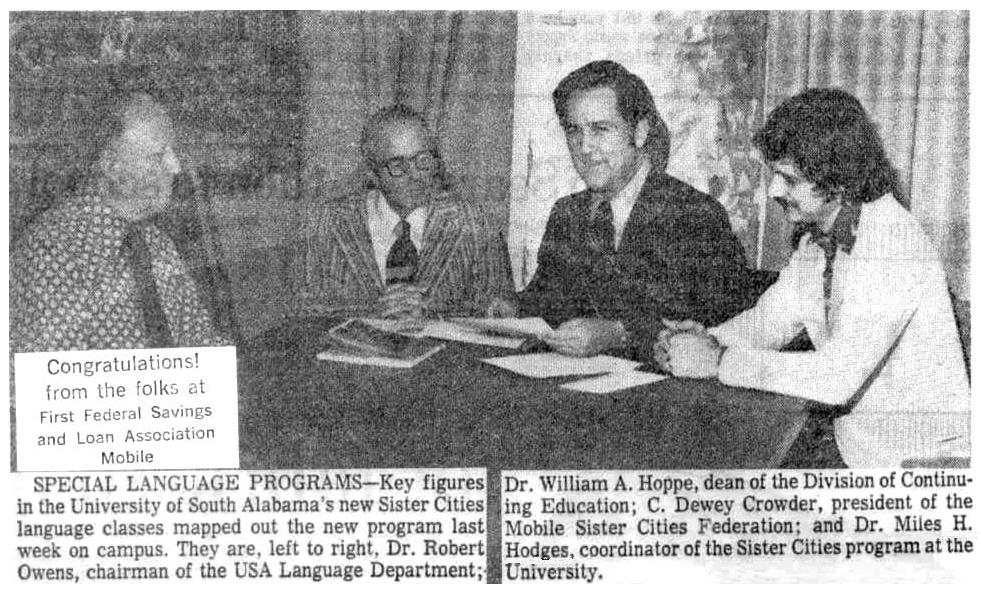
Also
a student of mine invited me to join him as crew on his boat during the
annual Dauphin Island Race. I enjoyed the experience very much, sailed
with him in a couple of more summer regattas, and decided to get deeper
into that world by joining the yacht club he sailed out of (the
Buccaneer Yacht Club). But I soon found that in not having a sailboat
of my own, the membership itself did not do much to bring me deeper
into that world. I would let my membership lapse.
It would be Martha who would really get us up and going with the Mobile
crowd. Being a Southerner, she knew exactly how to go at things, and
she was very social! For her, one contact led to another, and then
another, until we found ourselves amidst a wide circle (actually
several circles) of Mobile friends.
One of the things I came to note in entry into this new world was the
rather quiet graciousness of the "gentry" class of Mobile. Perhaps it
was because they did not need to "work at it" to make themselves
significant. They were already significant by way of birth. But this
was so different from the kind of ambitiousness that seemed to drive
the world I came from, but which also drove local politics right there
in Mobile as well.
In any case it did not take us long to find ourselves in "Mobile
society," in particular in the close social company with the local
"judge" (not really active as such) Judge Inge, and his very
aristocratic wife Eleanor. It was through them that our Mobile world
opened up, not just through an invitation to one of the all-important
Mardi Gras balls, but by becoming part of a small circle that met at
the Inge home to discuss the matter of what Mobile needed to do to
recover from the enormous economic disaster that hit the city when the
US government shut down the Brookley Naval Air Station, ending about
6,000 jobs locally in the process. It was in those discussions that I
began to learn how it was the "city fathers" – not the local
democratically-elected politicians – that actually shaped not only the
social but also the political and economic life of the city.
The Mobile "Colloquium"
I was so intrigued by all this that I decided to follow up on these
discussions by putting together a "Colloquium" on Mobile and its
future, conferences held once a week in early 1973 for six weeks at the
university, all six evening sessions led by my new friends Judge Inge
and the young and newly-elected county commissioner Bay Hayes that I
had come to know personally… plus a few others I had invited to take
the lead in the matter (I myself stayed behind the scenes). As it
turned out, all these sessions were well attended.
We invited officials (including the young mayor Gary Greenough),
businessmen (including officers of the town's Chamber of Commerce),
prominent lawyers in town, the newspaper editor, local labor union
leaders, pastors, community organization leaders, etc., to present
their views on the future of Mobile. The talks were frank, insightful,
and yes even inspiring. It reminded me how people could work together –
business and labor, Black and White (yes some of these local leaders
were Black) – if their goal was to find a higher social goal together,
rather than – as we so often find ourselves doing in hard times – going
at each other viciously, trying to fix the blame for social misfortune
on this local group or that local group.
I had seen that reach to higher things develop in Belgium. I was now seeing the same thing develop in Mobile.
So impressed were the leaders of the Mobile Chamber of Commerce with
the results of the Colloquium that they decided to continue these
discussions themselves.
And indeed, I was very pleased to see come from all of this, Mobile's
decision to become one of the first port-cities in the nation to go
largely containerized, not only assembling the considerable amount of
investment capital to get things going but undertaking serious
vocational retraining of their port labor force in order to make the
transition. No one lost his job in the process. In fact, this all
turned out to be a huge economic blessing to the town.
And I got to be part of this renewal, of what by this time had become "my town"!
Local politics
It was during that coming summer of 1973 that I decided that I also
would get myself more seriously involved in the city's political
dynamics, working with an actual campaign for local public office. And
it all started simply enough with a summer course I taught at the
university.
After that first year (1971-1972) of living in our tiny cracker-box
rental home, Martha and I were able to purchase a house (story and a
half with somewhat alpine features) on a nice-sized lot in a very
middle-class subdivision right across from the university. We moved in
(early summer of 1972) and then left the following week for Brussels
for the summer.
Upon our return, I set to the task of doing some upgrading of the
house, repainting the army green exterior in a warmer yellow, and
building a large roof over the large concrete patio behind the house.
To complete that work, we decided that we would be spending the coming
summer (1973) in Mobile. And to earn some extra money to help pay for
the upgrading of the home, I decided to take on some summer teaching at
the university (the only time I would do that!).
One of my students that summer was an older student, a criminal justice
major, simply meeting the last of his requirements for graduation. But,
as it turned out, he really liked my course, and at the end of it,
informed me that he planned to run for the position of county sheriff –
and would like it very much if I were to become part of his campaign
staff. Loving adventure as I did, I was quick to say "yes."
Indeed, I was already thinking about jumping (somewhat) into this world
of local campaign politics. Politics was, after all, my professional
field (or so I was believing at the time.) Also, I considered myself
quite knowledgeable about such matters, especially having lived in the
middle of that dynamic at the national level during my five years in
DC. And so I started work with some of the staff, helping (minorly) to
think through some campaign strategies.
Then something happened that really jolted me, something that would end my travel down the "local-politics" road.
I really was not keeping up that closely with things developing at the
grass roots in the sheriff's race, until I heard that I should be on
the lookout for an article scheduled to appear on the front page of the
Sunday's Republican Herald
newspaper (someone on the campaign staff got it put there). This was
scheduled to appear just a couple of days before the election itself,
and it would be a campaign clincher!
When the article finally appeared, and I was able to read what the
campaign staff had placed there, I couldn't believe it. They were
accusing their opponent, the rather noble and well-liked 20-year
sheriff, of major corruption.
But I knew enough about things that I was aware that none of this was
true. And certainly the staff I was working with knew that to be the
case as well. And yes, eventually the old sheriff would be able to
prove that none of this political "gossip" was true. But he would not
be able to clear himself publicly of this supposed scandal before the
election itself, only two days hence. That was the whole point!
And indeed, my student-friend went on to be elected the county's new sheriff.
I don't believe that he himself dreamed up such a shady strategy,
though I never brought up the issue to him (actually I really never
talked to him again after that, except to say hello on a number of
occasions).
Could a candidate actually not know of such doings within his own
staff? Believe me, yes. I knew that moral self-restraint was not a
major virtue to be found among those who could get themselves all
worked-up in their effort to bring a beloved leader to success.
Staffing a political campaign was a world unto itself, which the
candidates had to carefully keep an eye on – lest some of that staff
enthusiasm should carry the candidate himself off to political disaster!
Anyway, that was the last of my political campaigning locally. Besides,
a new world was opening up to me there in Mobile. And I found it less
dangerous and much more inviting personally.
|


|
AT THE SAME TIME ... THE WATERGATE SCANDALE
|
|
|
This does not mean that I veered away from the world of politics. The
study of a society's political dynamics remained front and center in
what I had dedicated my professional life to. And there was a lot going
on at the time in my nation's capital to keep me deeply engaged, not
just personally but also in much of the discussion going on in my
classes.
What I saw going on in Washington I cannot say turned me cynical. I
think I was already there in that matter! Nothing that happened in DC
would ever surprise me. But I still found what was going on there at
the time hard to digest.
I rather liked the way Nixon had opened up relations with China and
Russia, to work some "linkage" with these other major powers in his
determination to pull America out of Johnson's mess in Vietnam, and yet
leave something of a workable political legacy behind in Saigon, some
kind of reward for all the effort (and blood spilled) to get things to
go the "democratic way" in that country.
But he was up against a Democrat-controlled Congress determined to
undermine everything he was accomplishing. The Democrats were
humiliated by the enormous defeat in the 1972 elections of their own
presidential candidate, a dreamy intellectual that was loved deeply by
the Boomer-generation crusaders and their intellectualist academic,
media, and public-office-holding mentors. They hated Nixon, as a matter
of the highest principle.
And a political campaign stunt that went horribly wrong, something
undertaken by Nixon's own campaign staff, gave them what they saw as
the opportunity they needed to bring him down.
What was particularly galling to me was that behind this push to go at
Nixon was Ted Kennedy. It was Kennedy that put together the Senate
committee to look into the "Watergate" matter, the same Kennedy who,
four years earlier, had left a very pretty young woman (not his wife)
to die alone in his car when, heading to Chappaquiddick Island, it went
off a bridge and turned upside down in the water. Kennedy somehow got
out, she did not. And he did not even alert the police or a potential
rescue team about the matter, but spent the night with his family
trying to figure a way of covering over this new incident (one of
many), so typical of his life.
And now here was "Chappaquiddick Ted" leading the Nixon assault, from
behind the scenes of course. Was he doing so for the obvious reason of
his own lack of admirable moral credentials, which seemed, however, to
have had no negative effect on his standing with his Massachusetts
supporters – or with his Democratic Party either? Or was he going at
this political lynching operating from behind the scenes because he was
thinking of running for president in the upcoming national elections
and did not want his role in the inquest to appear to be purely
politically motivated, which it was indeed, as everything is in DC?
So yes, Nixon was finally caught trying to cover up the affair. A taped
conversation with his chief-of-staff Haldeman revealed him discussing
how to make this Watergate event go away, evidence that Nixon had
indeed broken the law in trying to head off a more extensive criminal
investigation into the matter.
Yes, the post-event cover-up was wrong, very wrong. But it hardly stood
out from the behavior that went on rather regularly in DC, including
among some of those serving now as his accusers. Indeed, how did the
Nixon crime stand out so much more strongly than Kennedy's cover-up
action after Chappaquiddick, so-much-so that the day would come when
Kennedy would be toasted as one of America's finest politicians, and
Nixon would be remembered in our public schools as the "evil president"?
Wow, the depths of political hypocrisy this all entailed!
Of course there was nothing I could do from Mobile about DC political
behavior, except comment on that same hypocrisy, and then watch in
helpless horror the following year as the American legacy in South
Vietnam collapsed so violently (there and even more violently next door
in Cambodia), due to further Congressional ideological tampering to
undermine what little Nixon had been able to accomplish there. Nixon's
enemies were determined to "get Nixon," no matter what the social cost
might be. And for the Southeast Asians, that cost was horrendous!
Nonetheless, despite what was unfolding in DC and Southeast Asia, life went on pretty normally right there in Mobile!
|
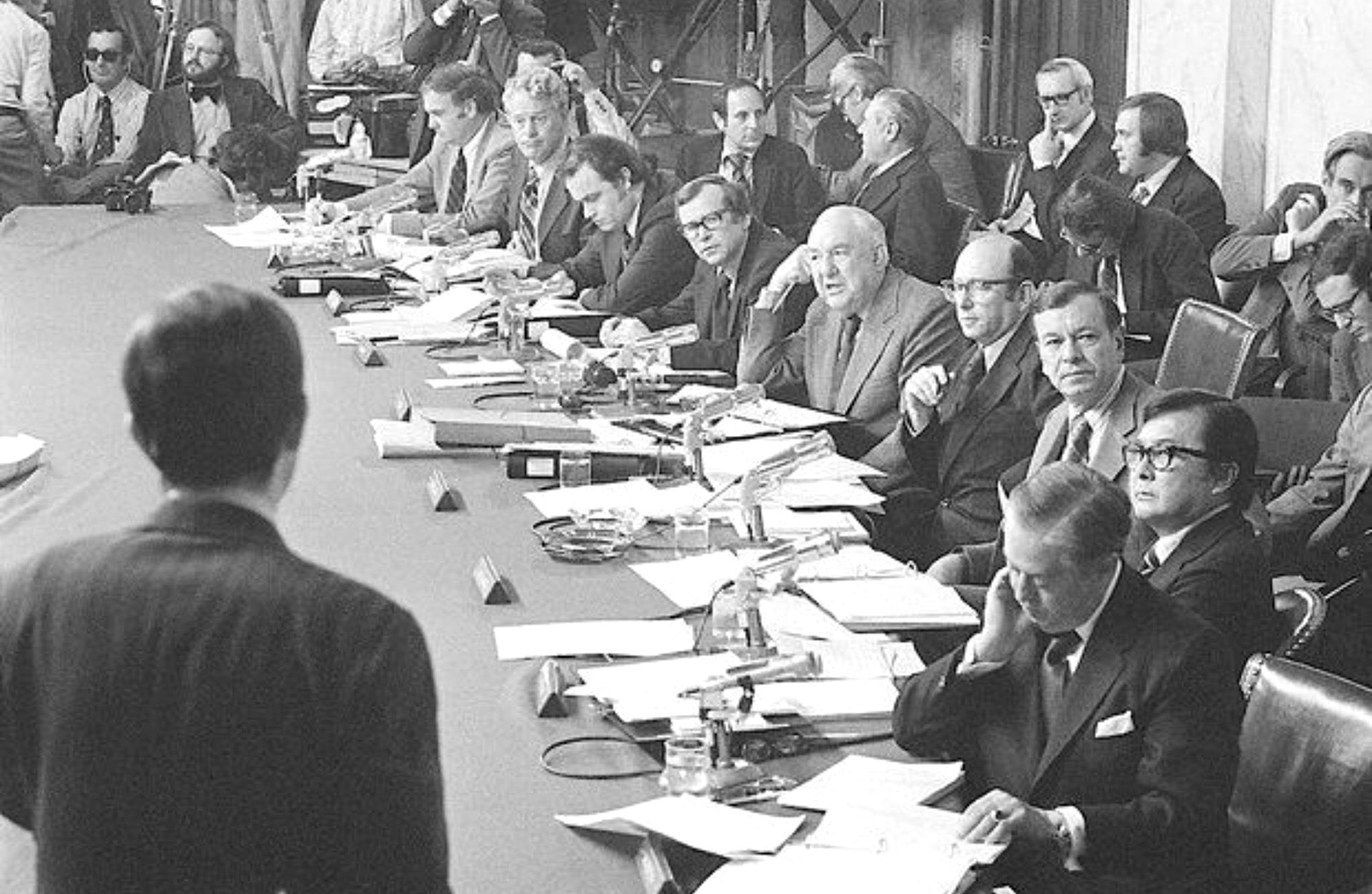
The Senate holding hearings ...
even before the House has presented its articles of impeachment.
But this was too opportune a political moment to be passed up
Nixon's legal counsel John Dean abandoning ship to save himself
by testifying against Nixon at the Watergate hearings
Nixon announcing his resignation ( to save the Republican Party from more damage) ...
also making the American press and the Democratic Party very happy at their success
in bringing down "the evil president."


|
MARTHA AND I SETTLE IN WITH MOBILE
SOCIETY
|
|
|
|
Restoring an old house in the Oakleigh Garden District
Martha, meanwhile, was eager to put us in the heart of our opening
Mobile world, pressing me to look at the possibility of moving from the
university area to the center of "Old Mobile." So, one Saturday in
early 1974, we drove downtown to visit Martelle and John (an older
couple who had become very deep friends by this time), who drove us
around the Oakleigh Garden District – where they themselves lived. This
area once was a beautiful neighborhood of rather majestic
turn-of-the-century homes, many of which had been turned into boarding
homes (or worse) and allowed to run down. However, the area had
recently been declared a national historic area, and was just beginning
to be "gentrified" by young professional couples moving there and
beginning the process of a serious makeover of these once-splendid
homes.
I became interested, and contacted a real estate agent who showed us a
house in the District at the end of a street, Georgia Avenue, next to a
park. The house was magnificent, but in terrible shape. However, it had
great promise: fireplaces in 6 rooms, 11' ceilings downstairs and 10'
ceilings upstairs, a beautiful staircase, and lots of room.
But admittedly, you had to have lots of imagination to see past the
filth and decay. Close friends of ours, Richard and Millie, told us
that when they first saw the house, they thought we had lost our minds!
But that spring, I tore out the walls of one of the four bedrooms
upstairs to open up the stairway and to create an airy openness about
the second floor. I built a new bathroom upstairs and fixed up one of
the bedrooms with a large closet. And by the summer I was going hard at
it, working on the kitchen and an adjoining breakfast room, created by
glassing in a back porch.
This activity occupied me totally until we decided to move in in
August, when we received a very nice offer to purchase our university
home and felt we could not pass it up. Indeed, the really great thing
about this venture was that we incurred no extra debt in restoring the
Oakleigh home. Indeed, we had enough money from savings and from the
equity in the sale of our university home that we were able to pay cash
to the plumbers, the electricians and the central-heat-and-air people.
Of course, the house was far from complete when we moved in. Indeed,
Martha and I would find ourselves living amidst a lot of construction
work (and dust!) over the next couple of years while I worked away at
the house. But step by step we finished the kitchen, upgraded the
dining room, built a library, and completed the makeover of the three
bedrooms (and yet another bath that I installed) upstairs. And we
furnished these rooms with some great antiques that we were able to buy
locally. One of these was even an antique father clock, over 7' tall,
dating from the late 1700s, whose case I refinished myself (14 coats of
lacquer, hand rubbed between each coat!).
We now had a beautiful setting to entertain our friends, which was a
most frequent event. Parties and other gatherings happened there often.
And we were into the "gourmet thing" with a number of our friends, and
found that putting together some extravagant meal was a delightful way
to spend a Saturday evening. Indeed, looking back, it seems hard to
remember when during those days Martha and I had dinner home alone with
just the two of us. But that's the way we wanted it.
|
Our interest in the Mobile Community soon led us to leave the
university
area and in 1974 move
to an old Southern home in a downtown neighborhood (the Oakleigh Garden
District) just beginning to undergo "gentrification" (mostly young lawyers, bankers and
businessmen
working downtown now moving to the
neighborhood).
The exterior ... before and
after
It
would
turn out to be quite a project … for the house needed lots of
work.
But architecture
and hands-on construction I
loved.
The inside was in dismal shape when we first started out.
And the
neighborhood
itself was awesome … not only with its classic
homes … but with
neighbors helping neighbors rebuild the
community.
Our block on Georgia Avenue
We not
only
knew virtually
everyone on the block, but in the surrounding area as well … through our
participation in the Oakleigh Garden
Society.
Concerning the house
restoration, I designed and did all the work myself.
The kitchen … in
a state of early development … and
upon completion.
The Library – before and
after
More of the library, the
living room and the dining
room.
The breakfast room before and after … and the entry
hall.
A special project of mine was a
grandfather clock – dating back to the end of the 1700s or beginning of the
1800s –14 coats of lacquer hand rubbed between each coating!
Not having
any
children to distract us, our home was very often a gathering place for other young
couples.
Here we are
(1976) at dinner with people who played a large role in our lives: 1)
Jim (left) a former student and my first Model United Nations organizer
(by this time now a lawyer, first in Washington, then in Texas; 2)
Rodger (far right) who brought me on as sailing crew to John Van Aken and who
was at that point an architect (somewhere in New England?); and 3) our
neighbors across the street, Tish and Tony ... whom we would team up
with in the house-restoration business.
And then there were just parties held at our home as well.
What's this? Dinner with Brenda and Paul ... out of aluminum pans?
And Bootsie helping Martha play the recorder?
Still at it with Tony and Tish!
(1981)
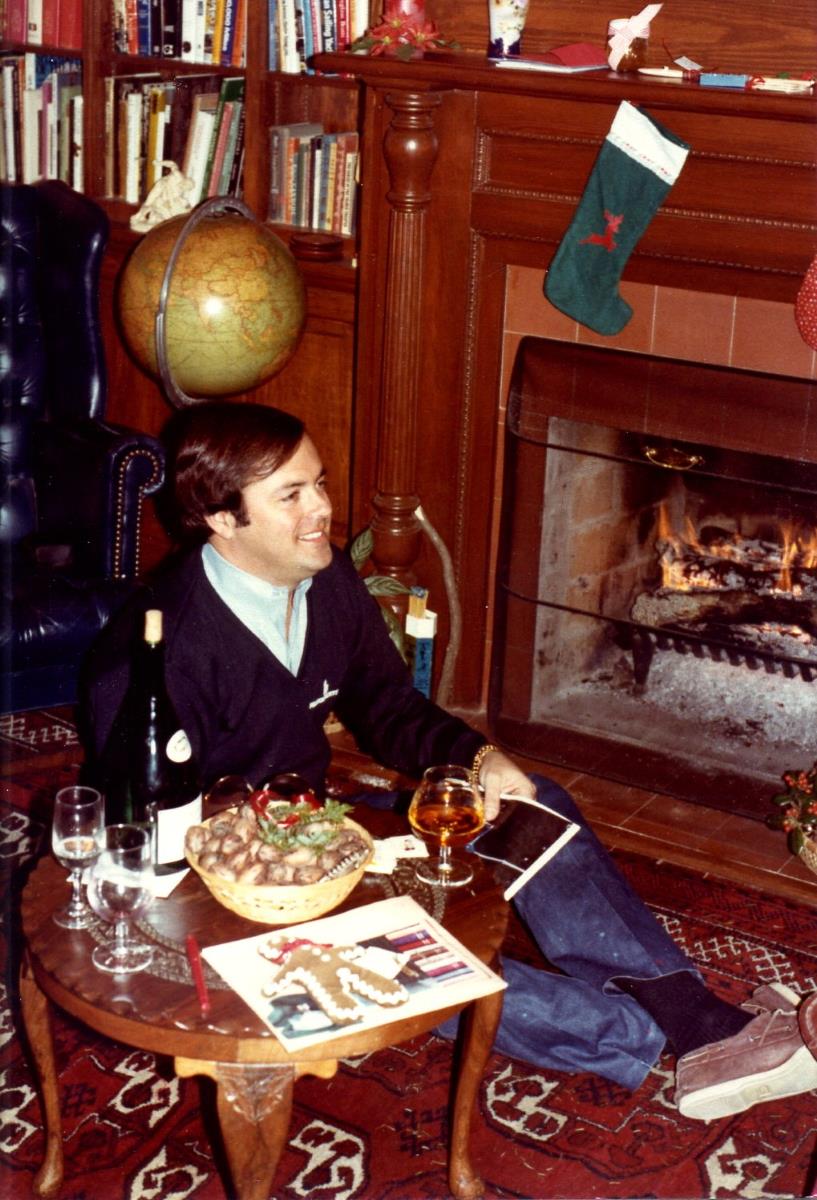 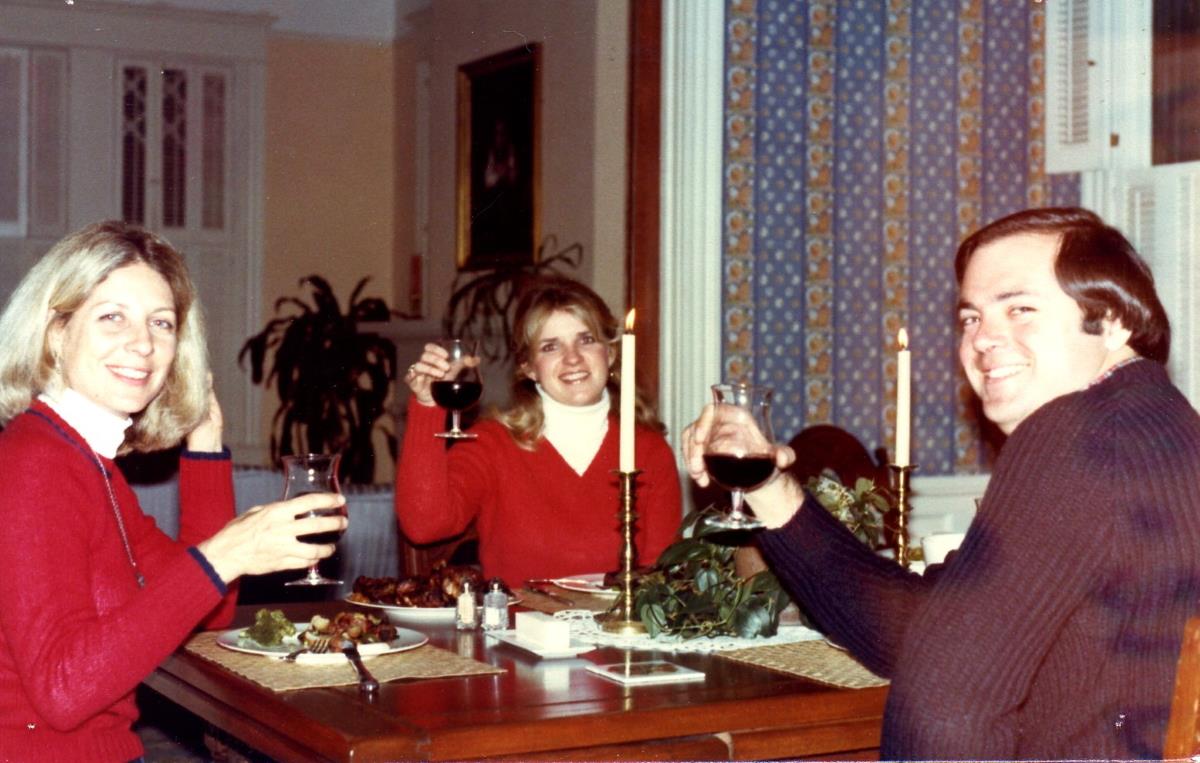
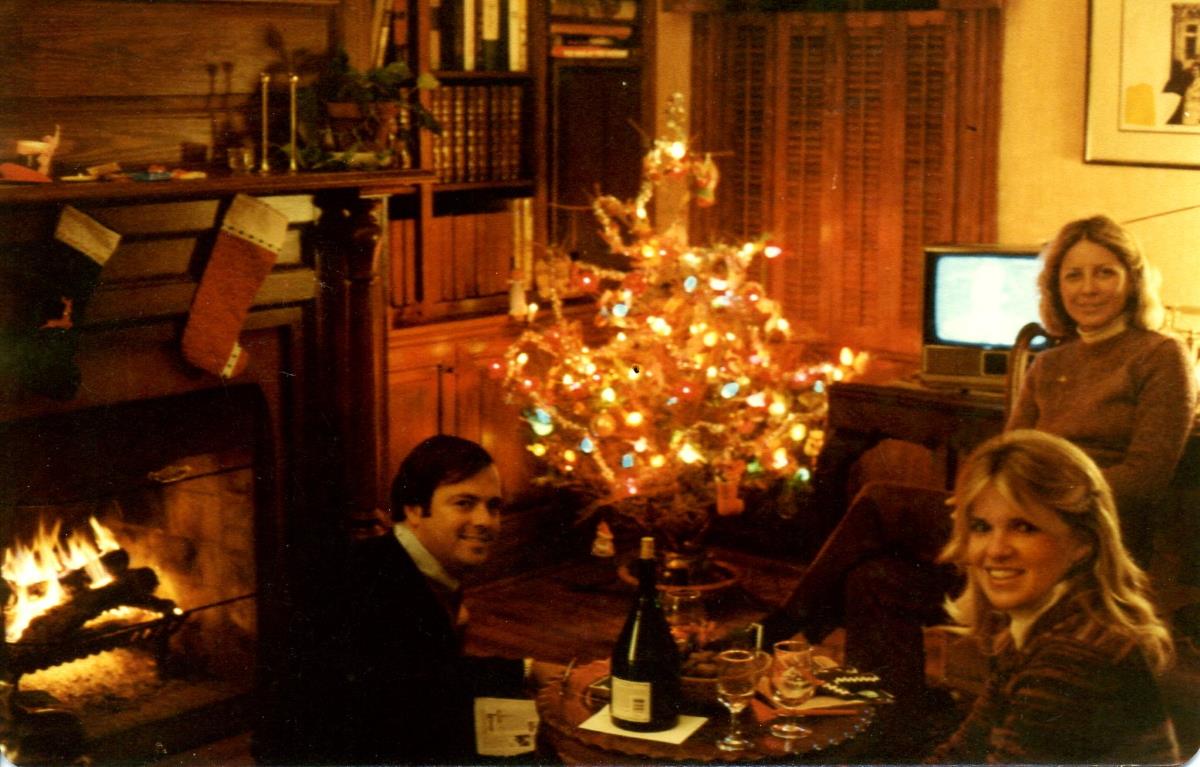
|
The Oakleigh Garden District itself
Oakleigh was by this time a vibrant community of young professionals
much like ourselves in interest and activity, lawyers, bankers,
shipping agents, etc. There was only one other professor in the group,
Woody (a true New Englander) – a young history professor with whom I
carpooled to the university most every day. Everyone worked closely
together in bringing the neighborhood forward, virtually all of us
serving as members of the very active Oakleigh Garden Society. And it
was through participation in this organization – and the way that we
shared insights as to effective restoration strategies and which
plumbers, electricians, etc. were the best to go with – that we came to
know our neighbors quite well, and quite far and wide in the Oakleigh
district.
And there were a number of activities that added to that sense of
neighborliness. Besides the Garden Society, every October there was the
annual street dance put on by the first block of Georgia Avenue (the
street we lived on, just off the town's main street), an event attended
by masses of people, complete with band, refreshments, and just a lot
of dancing and socializing.
And there was the Oakleigh Marching Society, just a "fun thing" when we
would put on second-hand Mardi Gras costumes, and on the morning of
Mardi Gras, gather in front of someone's home (ours in fact in 1979)
and join the day-long Mardi Gras parade, for our part, marching from
our district down to the center of town (our group usually led by a New
Orleans marching band), where we would end up at the Malaga Inn's
courtyard, and where we would continue to party (with yet another
band), until most of us had to go off to more formal Mardi Gras balls
elsewhere (later that afternoon and evening).
And there was the annual Halloween event, in which we would set up one
of the houses still under deep reconstruction as the Haunted House, fix
it up with "haunted" rooms, dress ourselves up in all sorts of weird
Halloween costumes (once I put myself on drywall stilts, becoming about
8' in height) and then scare the living daylights out of the
neighborhood kids, particularly the Black kids of the neighborhood, who
would typically circle around to go through the visit a second and then
a third time, they loved it so much. And we all had great fun doing
this for them.
|
We
had the annual street party on our own street to look forward to
each fall.
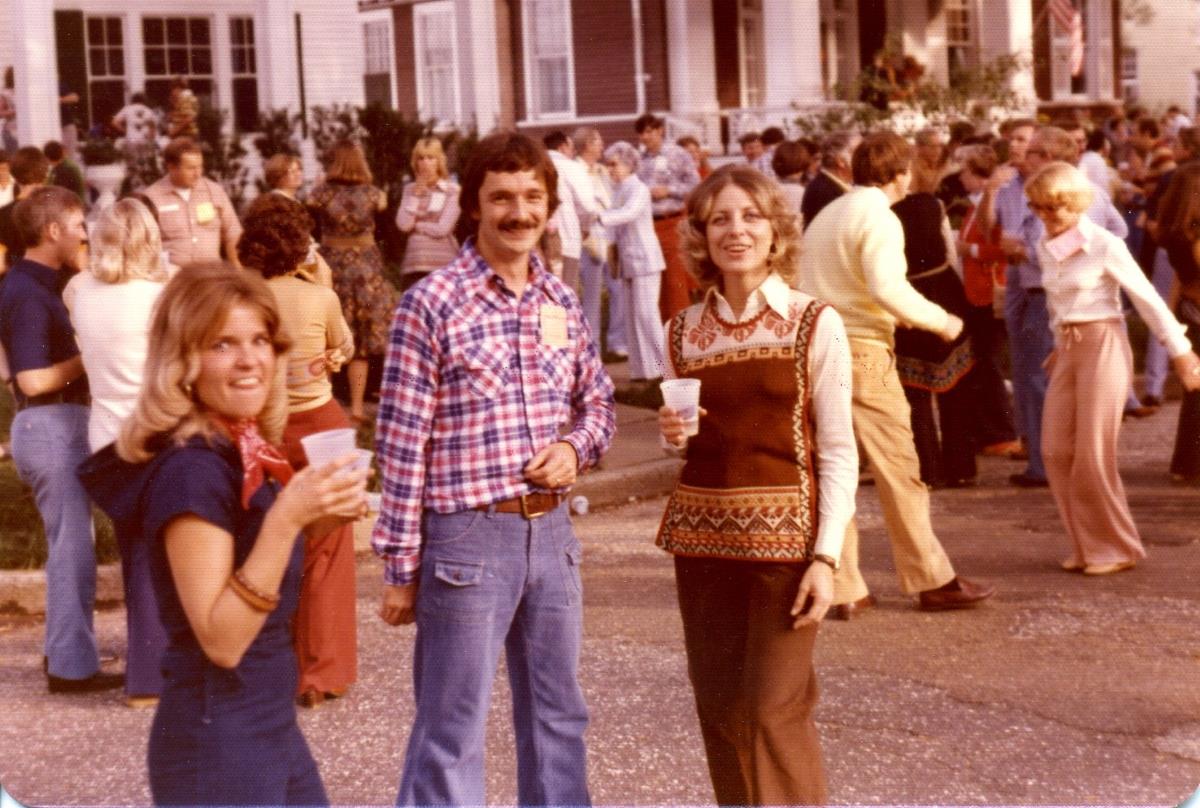 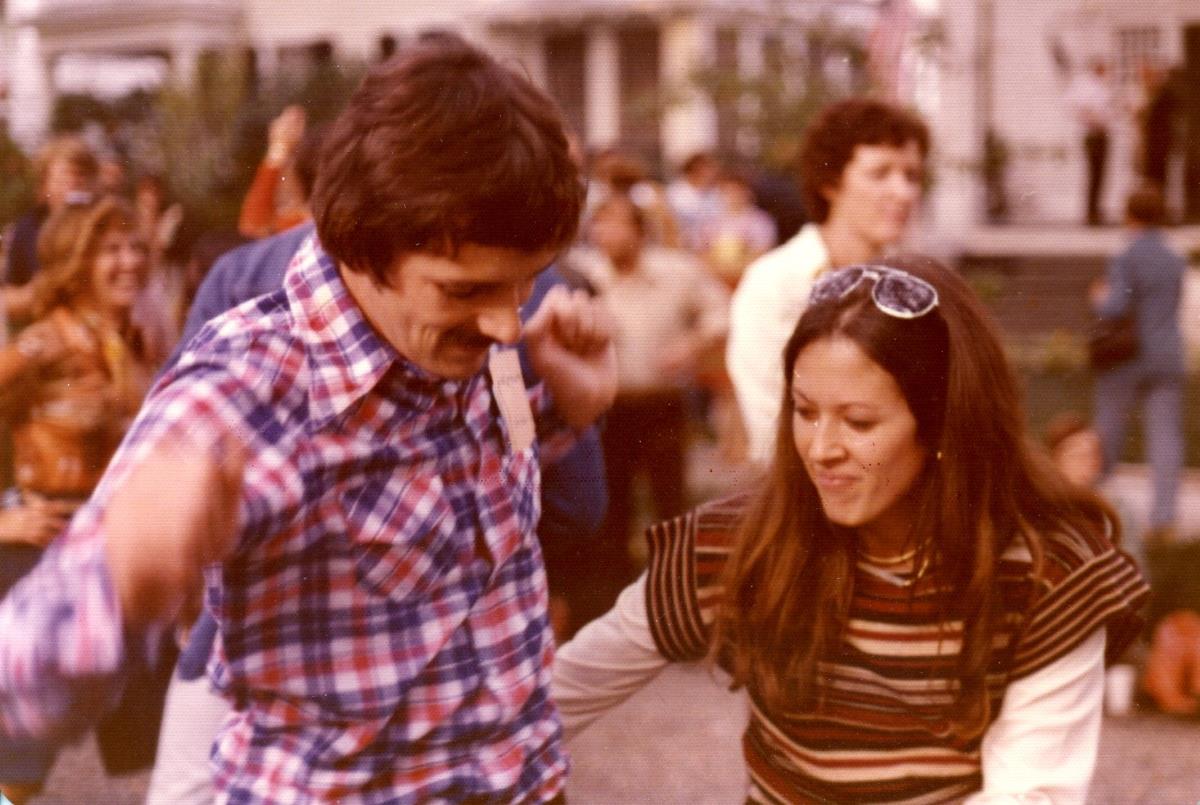
And there was Mardi Gras (usually taking
place in February or
March). Here the Oakleigh Marching Society gathers at our house
… to begin its march down Government Street during Mardi
Gras.
Needless to say … we all had a great
time!
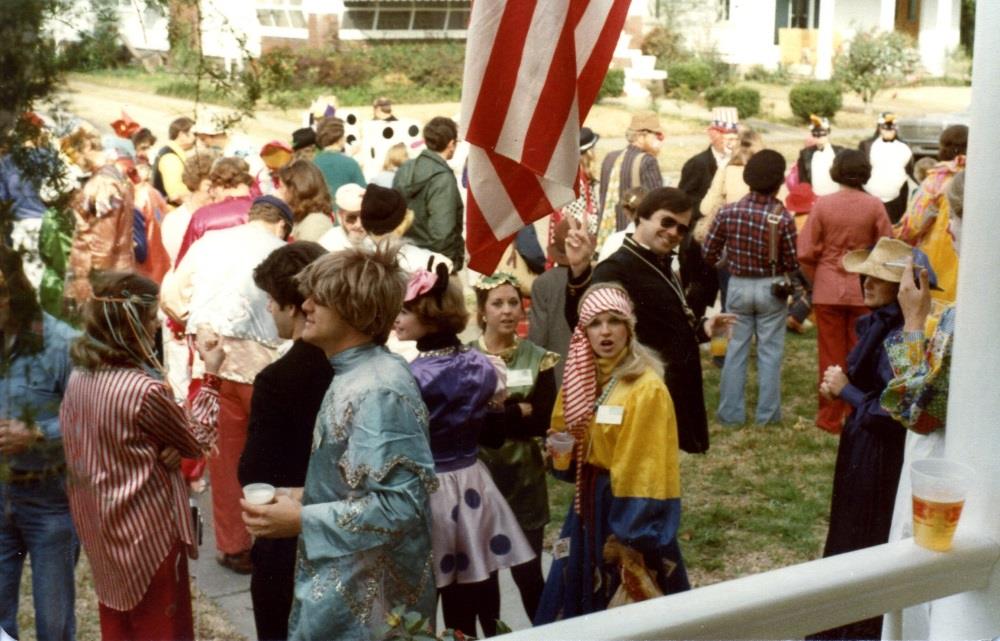 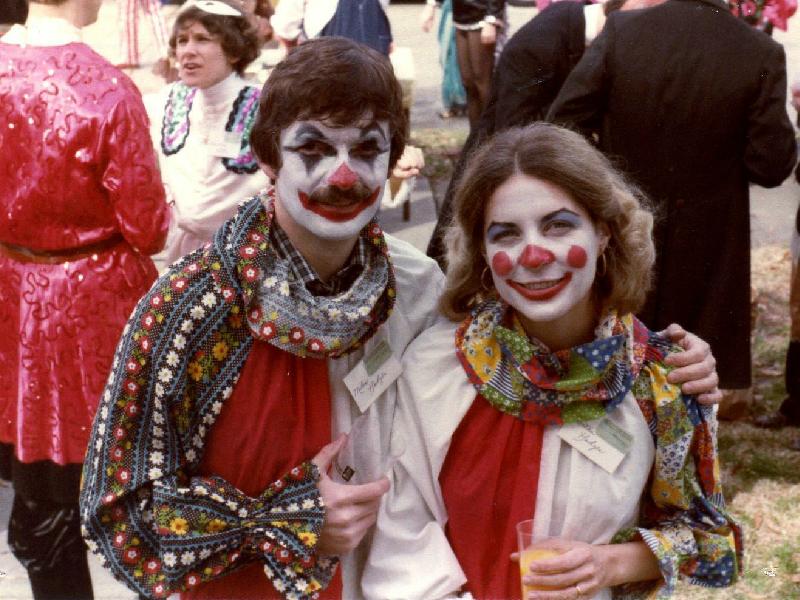
It could also be
very tiring! Here we are resting up after one or
another Mardi Gras Day!
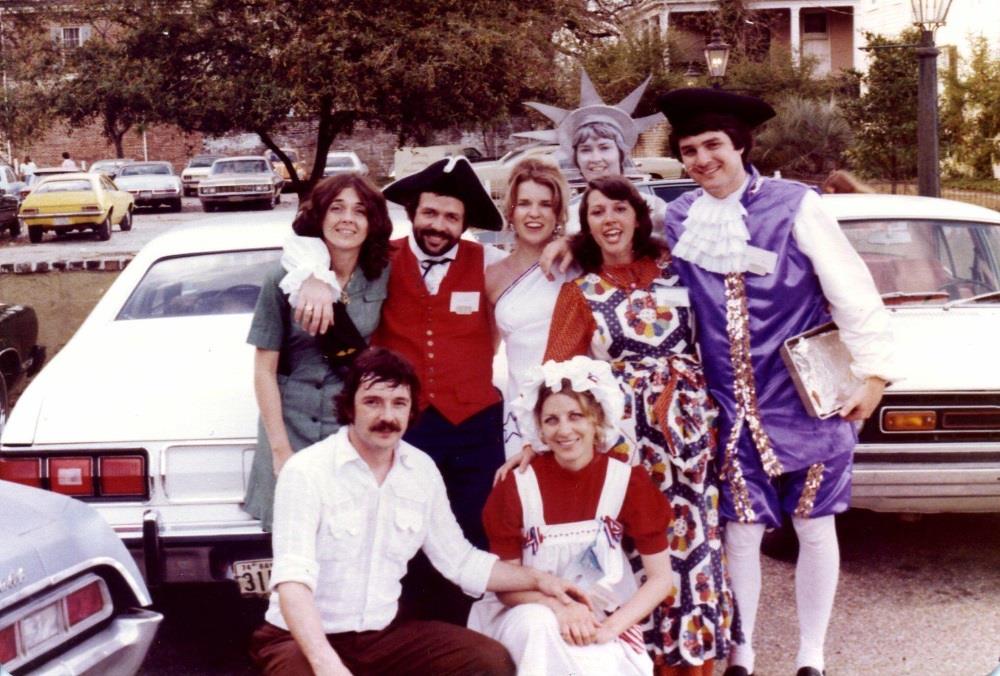 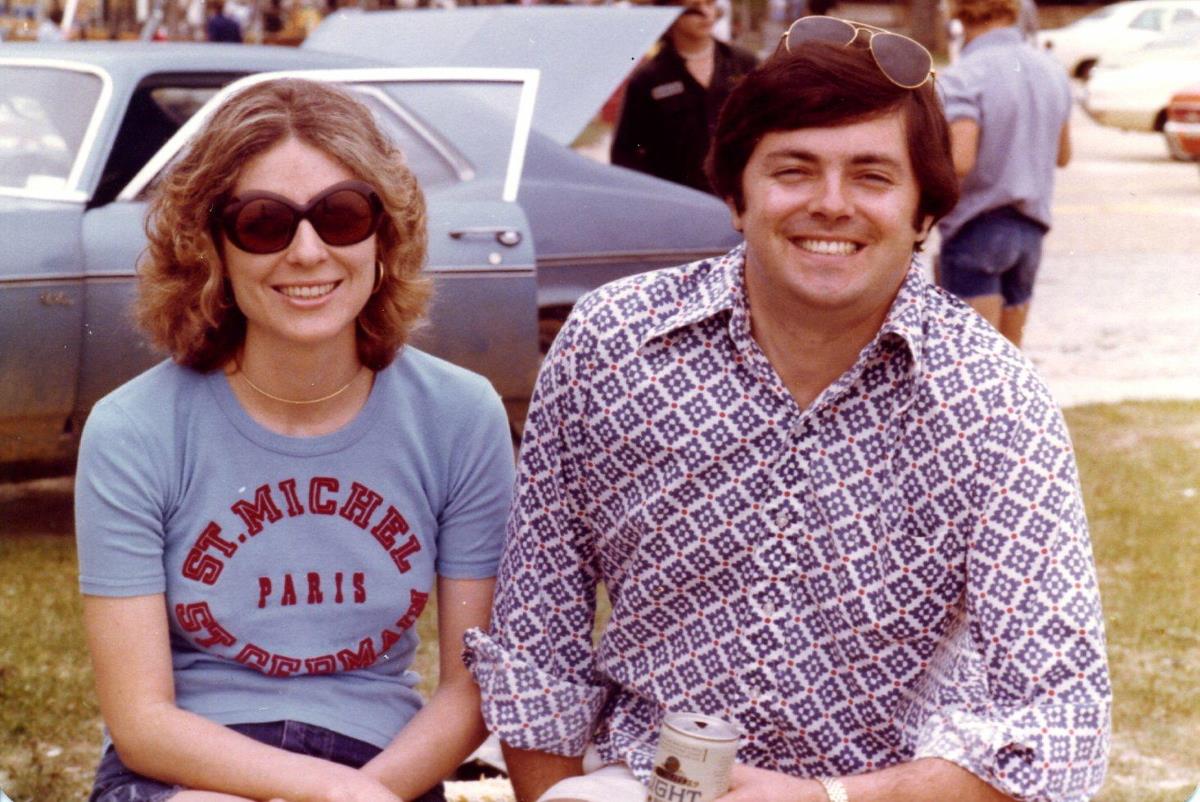
|
The social dynamic of Oakleigh included
also our
annual Haunted House in which we decorated a house still under
reconstruction (scary enough in itself) … and opened it up on Halloween
to the neighborhood kids … to scare the life out of them. They loved it
… and
would circle back to go through the tour several
times! 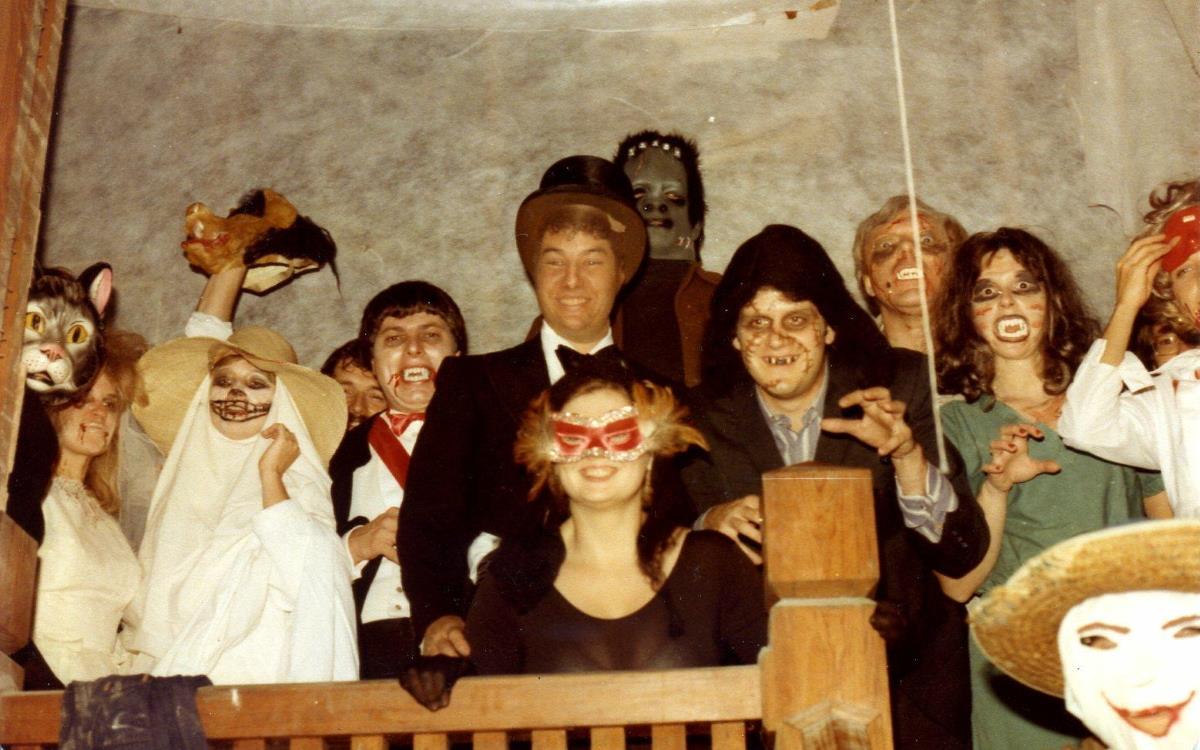
|
Sailing becomes a serious matter for me
It was when a friend Rodger invited me to join him in crewing with John
Van Aken, that my world of sailing really took off. The owner and
captain of the 30' sailboat I came to crew was a generation older,
Dutch-born shipping inspector for Lloyds Bank of London, and also South
African consul for the port of Mobile. He raced his boat constantly
through the very long Mobile regatta season. So I found myself serving
regularly as crew (it seems most weekends during much of the year),
slowly making my way forward as winch operator, then foredeck crew (jib
and spinnaker), then finally navigator (plotting racing strategies from
the maps and electronic gear). And we generally were very successful in
these competitions! For seven years I would sail under his
captaincy.
|
Saturdays and Sundays were
spent (for seven years … nearly year-round) crewing for a
Dutchman, an outstanding yacht racer. I
learned to love sailing from him. (No, I did not go to Church on
Sundays.
Actually, I didn’t even really think about
it.)
In case you didn't recognize me, I'm the guy with the mustache!
The captain's son, Tony, is the guy in the striped shirt.
We would become close friends.
|
Business partnership with Tony
As an interesting side result, I was to become very close (certainly
closest of all of my friends) with his son Tony, who joined us as
fellow crewman after graduating from college and then taking a job in
town as an international banker. In fact, Tony and his wife Tish were
to buy a house just across the street and down three houses from our
own home on Georgia Avenue, where he too learned the art of renovating
an old Mobile home.
And very importantly, Tony and I were to go in together to create the
Mobile Restoration Company, and begin the purchase and redevelopment of
other Mobile homes, earning some historic restoration awards from the
city for our work. But more about that later.
Eventually, Martha and I were to go on and buy our own sailboat
(another 30' beauty), of which I would do considerable upgrading, and
which we would cruise rather than race, and which would become a major
setting for the entertainment of friends. Also, more about that later.
|
1976 the startup of the housing restoration business with Tony and
Tish
Having
done such work on our own homes, we took an interest in continuing this
work. We started out doing much of the work ourselves ... but quickly
took on contractors to help out
Our first project ... in the Dauphin Way District (we received an
historical award for our work)
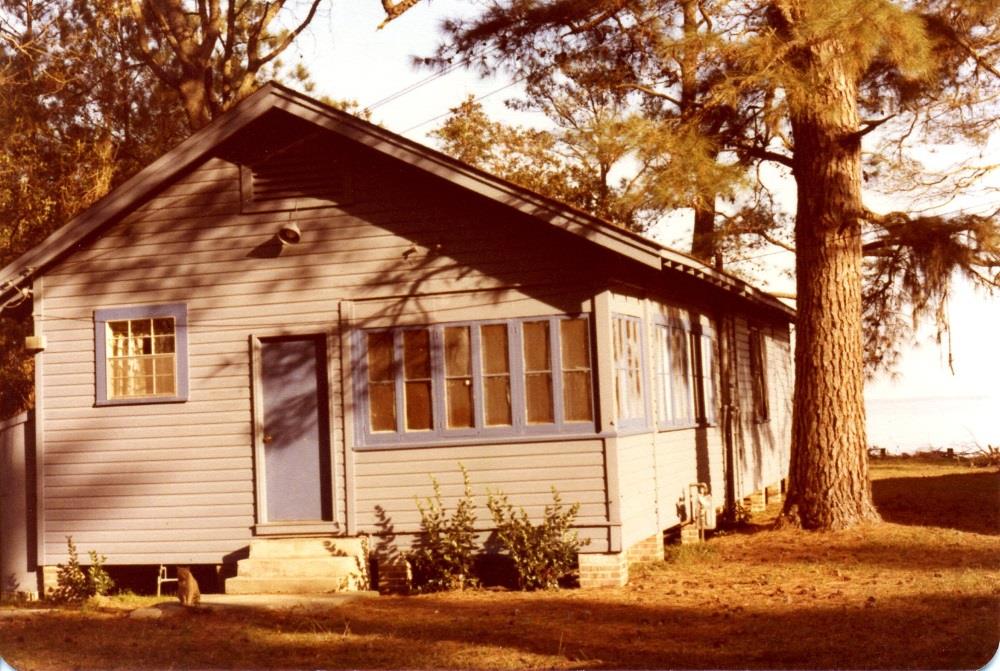 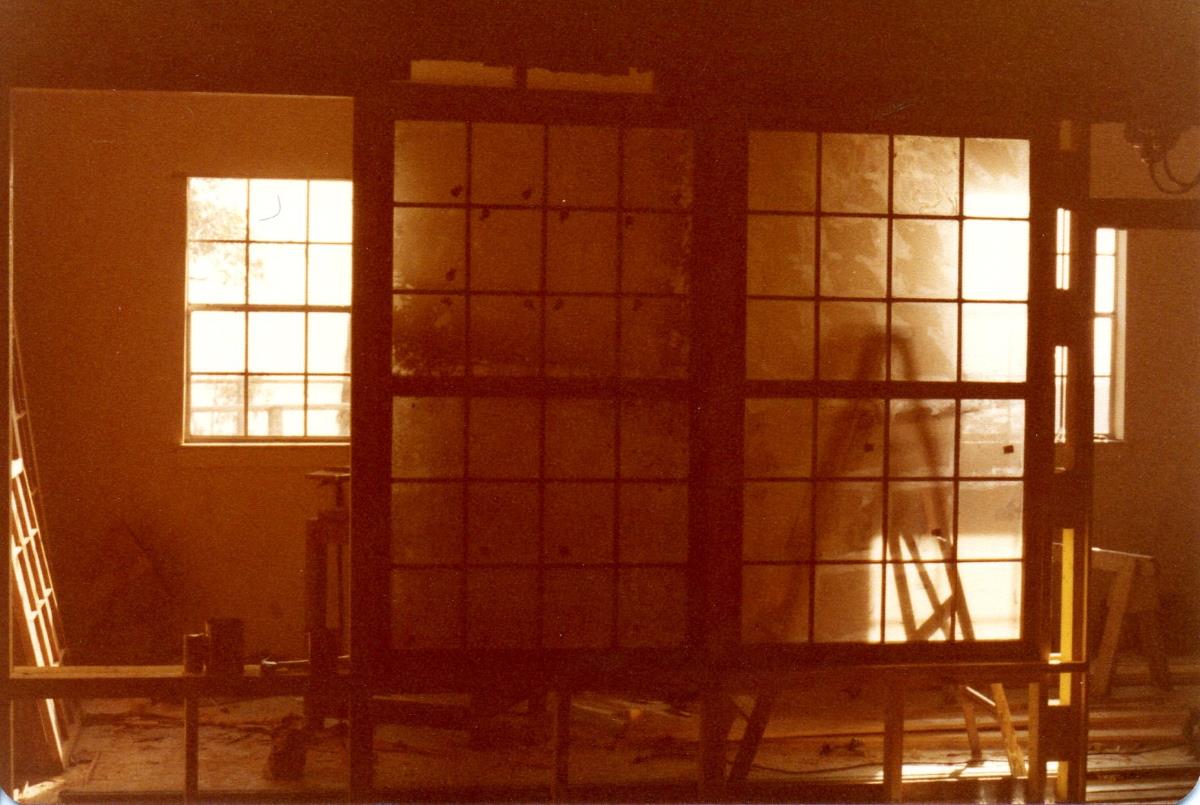
Another project we took on was a small house on Mobile
Bay ... which we opened up the back to a full view of the bay This work we did
by ourselves.
|
Summers at home and abroad
Of course, I was not sailing every weekend of the summer, because
Martha and I, both being teachers, had our summers off, giving us a
great opportunity to do what we loved best: explore. And most normally,
we found the object of our summer explorations to be Europe.
Our first summer back in Europe was in 1972, when we returned to
Belgium, supposedly for me to do some follow-up work on my doctoral
research. I had actually finished my doctoral research and writing the
previous year (1971) in the spring, was able to offer my doctoral
defense that fall, and finally just that June had officially been
awarded the PhD (one of three receiving their Georgetown PhDs in
political science that year), sent to me in the mail! Anyway, our
summer in Belgium proved to be more social (with our friends Victor,
Pierre and Anne) traveling and relaxing at the Belgian shore, and of no
great consequence academically. We returned briefly to Belgium also the
next summer (1973). But the summer after that (1974) was spent in
Mobile, fixing up our new Oakleigh home.
Then the summer after that (1975) we found ourselves again back in
Europe, this time living in Paris for the summer. The work I had been
doing with the Mobile Sister Cities Program had led to a contract
offered by the counterpart French organization (Cités Unies), in which
they wanted me to put together a study describing and comparing the
development of both the American and French approach to town twinning.
This not only had me busy doing a lot of interviewing (including
someone in the US State Department, because Sister Cities was actually
a part of official American diplomacy), but also doing a lot of
traveling around France.
While we were there we were visited by Brenda and Paul, who lived up
the street from us on Georgia Avenue, whom we did not know very well
yet, but who, when they heard that we were headed for Paris, took up
the challenge to come visit us. This was their first trip abroad, so we
gave them the special. After showing them Paris, we headed down to
Innsbruck (Austria) on an overnight train and then spent the next day
climbing the mountain behind our motel. From there we crossed the Alps
to Venice, and spent a couple of days seeing the sights in that lovely
town. Then we returned to Paris and spent some more time together – in
incredible heat (Paris was not used to this heat and air conditioning
was rare) before we put them on the plane to go home.
After they left, things just seemed very dull. "Bored in Paris" was not
something we had ever expected. Anyway, we suffered the heat for a
couple of more weeks, then headed up to Antwerp, to meet my father, who
was there on business. The next day we took the train to Luxembourg and
headed home.
For no particular reason we stayed at home the next summer of 1976. It
did, however, give me the opportunity to undertake and finish the very
complicated library project in our home.
But that summer we did get a Sister-Cities exchange visit from France,
and became hosts at our home of the youngish (and quite stylish, and
yes, a member of the French Communist Party, would you believe!) mayor
of Arles and his wife, who were leading the large group.
America having a hard time celebrating its bi-centennial
It was July 4th at the time of their visit, and supposed to be a time
of great celebration, for the day marked 200 years since the signing of
the Declaration of Independence. But despite the fireworks and grand
effort to make the most of the event, it was a sad time in America.
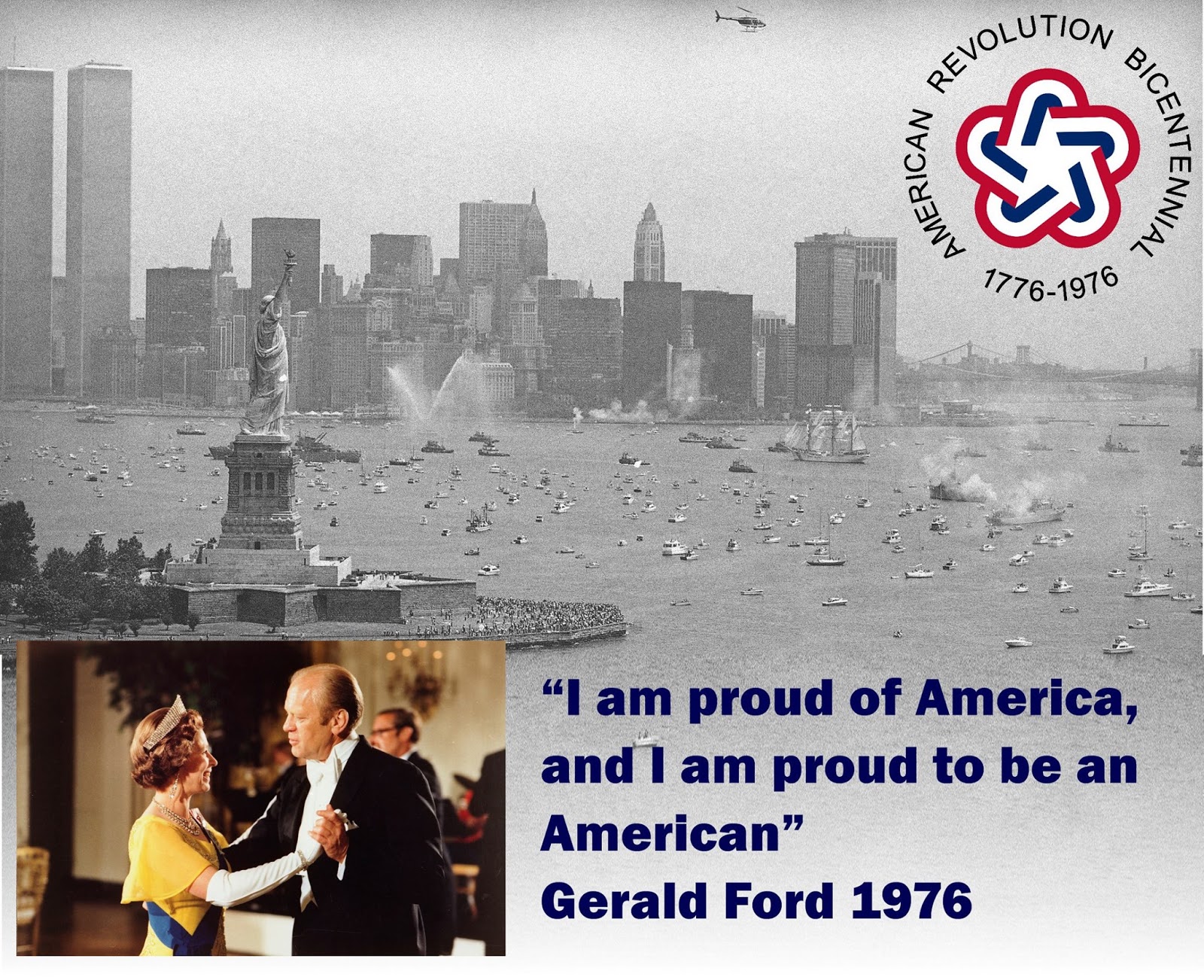
As a political swipe at the Republican President Nixon, a
Democratic-Party-controlled Congress had foolishly declared to the
world that it was ending America's "imperialist" role in Southeast
Asia, and was cutting off all further support, even just financial
support, of our allies in the Saigon government, an invitation for the
North Vietnamese to do their worst! Consequently, after Nixon had been
chased from office in August of 1974, his replacement Ford had to
preside over the humiliating escape of the last of the American
personnel from Vietnam in April of the following year.
Furthermore, what we Americans left behind in that country as our
legacy was the horror that the Communists then unleashed on the many
Vietnamese who had supported the American presence in their country
those many years. They would pay heavily for that relationship, either
killed on the spot or dragged off to prison camps where they were
treated to a very brutal "re-education" of their social thinking
(brainwashing), the process so harsh that many died there as well.
And this horror was accompanied by an even greater one next door in
Cambodia where the collapse of the American-supported political status
quo in the region led to the Communist (Khmer Rouge) "Killing Fields"
that brutally depopulated Cambodian urban society.
And most Americans suspected that behind it all, our cowardly retreat had brought all that on.
And that's where things stood as we supposedly celebrated two centuries
of American greatness. But things weren't feeling so great at this
point.
Nonetheless, we in Mobile made the most of the visit of these new
French friends, timed with what was supposed to be a wonderful 4th of
July celebration.
And indeed, Martha and I enjoyed their company enormously. And we would
be invited by the Arles Mayor and his wife – and accept the offer – to
stay with them in their summer home in the Jura Mountains the next
summer when we returned to Europe.
Back to Europe
So, yes, the next summer (1977) we were back in Europe. Very
conveniently for us, my parents were now living in Antwerp (my father
was continuing the work that had brought him there previously), and we
made their beautiful and spacious home there something of a base camp
to work from. Again, Brenda and Paul joined us in Europe, meeting us in
Portugal, where we enjoyed enormously the country's wonderful seafood
dishes! We then headed through Spain to Morocco, and spent a number of
days in the quite medieval (but also very Muslim) city of Fez. Then we
headed back to Antwerp, where we all got together with Tony and Tish,
who joined us there.
Tony and Tish were at that point finishing up their summer visit to
Europe and it was time for Paul to get back to work. But Brenda was
able to join Martha and me for an ongoing visit to England, a country
which Martha and I loved deeply and which we had visited numerous times
when we ourselves were residents in Belgium. We then returned to
Antwerp, hung out there a bit longer, and finally headed home. No, this
time we were not "bored in Paris"!
One more trip would follow the next year (1978), when again we were
joined by Brenda and Paul, who had recently moved to Atlanta, Georgia,
but stayed in close contact with us. My parents (still living in
Antwerp) lent us their car, and we headed off to the French wine
regions of Burgundy (Eastern France) and Bordeaux (Southwestern
France), trying to become wine "connoisseurs" through our many visits
to the wine cellars of Burgundy and the great wine estates of Bordeaux.
It was a very enjoyable summer.
It would also be our last trip together to Europe, although we did not
know this at the time. But events were about to unfold that would
change the very patterns of our lives, deeply.
|
Meanwhile, both being
teachers, we also had the luxury
of fantastic summers abroad. And with my parents' move to Antwerp in Belgium in 1977, we
had a home base to work from.
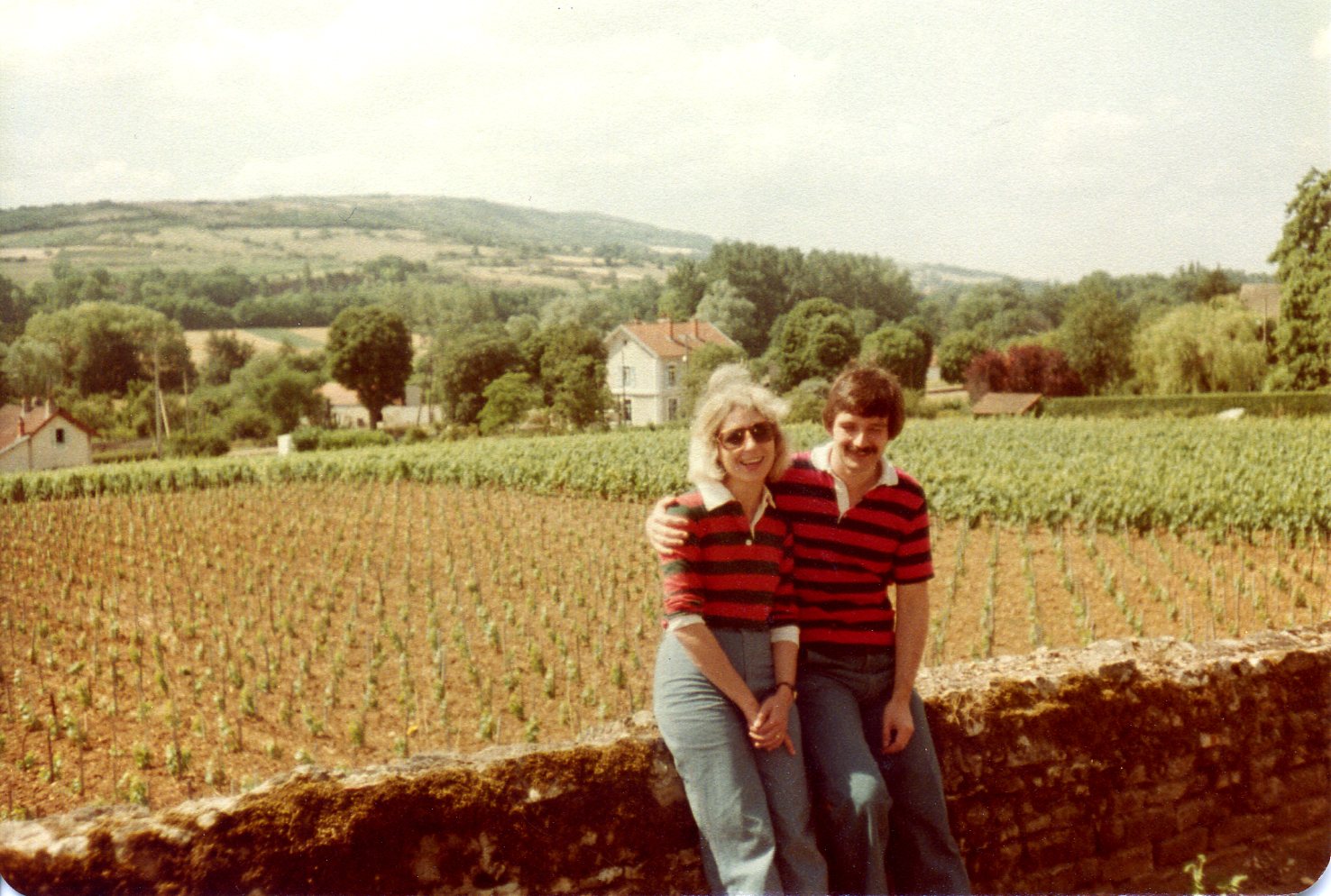 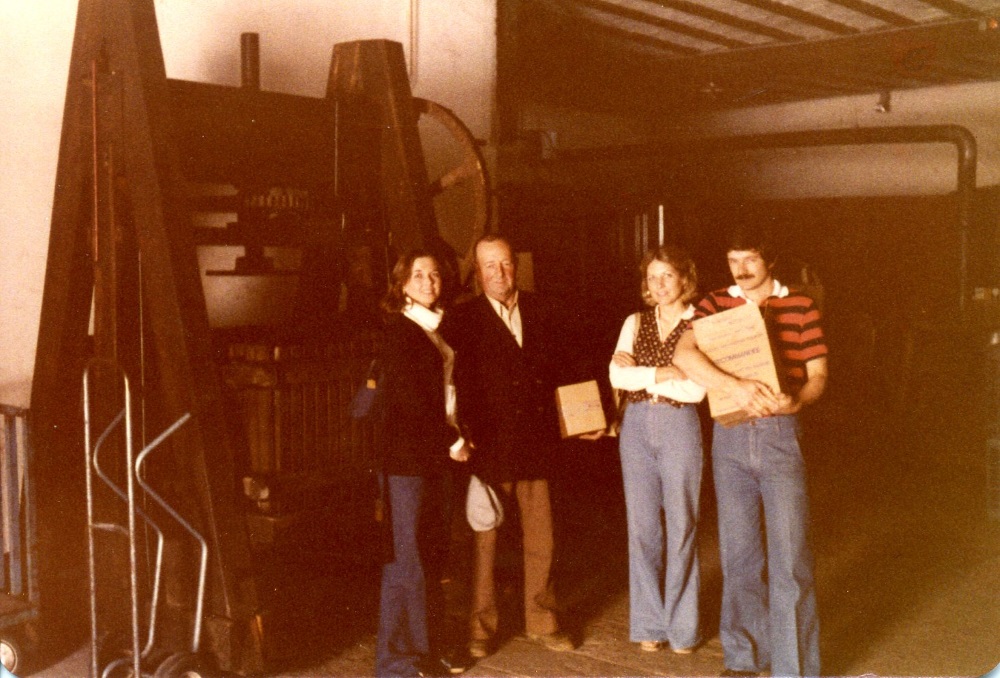
Here we are in 1978 touring the wine
country of France
with
Mobile friends, Brenda and Paul (Paul taking this picture)!
|

